Presentation Year 12

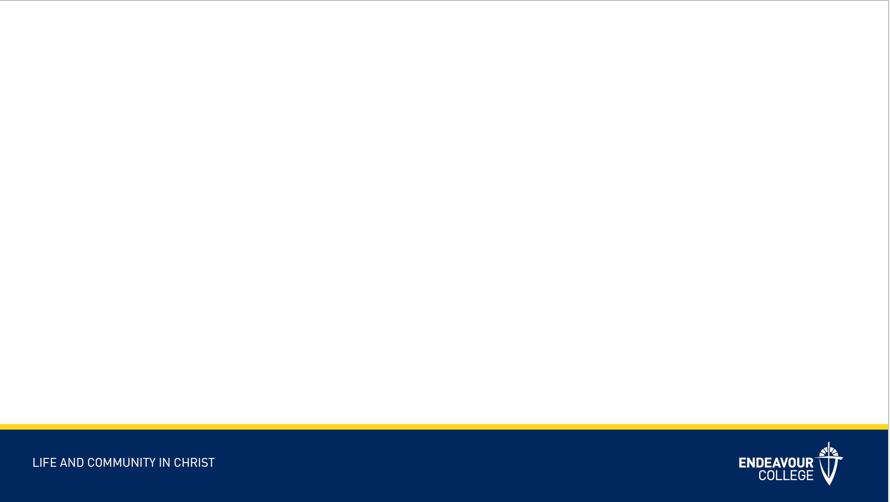
Year 12 Support Team – the Village Model
• Care Group Teachers and subject teacher/s

• Heads of Village (Course Counsellors)
• Head of Senior School – Michael Vickery
• Director of Learning - Sandra Barry
• Counsellors (The Well) - Marni Harding & Henry Lee
• Adaptive Education (The Hub) - Carol Thomas
• Student Pathways Leader - Deb Frahn
• SACE Coordinator - Lauren Gray
What’s Different about Year 12

• Subject differentiation
• MAX
• Relationships with Staff
• Study Lessons
• Off Campus Permission
• Driver Permission
Student Leadership

• Not just for the Student Executive
• Endeavour Way in action
• Leadership and role modelling
• Involvement in College activities
• SAT
• Formal Committee
• Clubs and sporting opportunities
• Swimming, athletics etc

Year 12 Events
• Swimming Carnival – Wednesday 26 Febuary
• Athletics Carnival – Tuesday 18 March
• MFS Road Awareness Program – TBC Term 1
• Formal – Friday 28th March
• Year 12 Jumper – Soon…
• Mid-Year Examinations – Monday 30 June – Friday 4 July
• MAX Retreat– Wednesday 23 – Friday 25 July
• Drug Awareness Guest Speaker Paul Dillion – Term 3
• Final Breakfast and Assembly – Friday 24 October
• Final Examinations – Beginning Monday 3 November
• Valedictory Service – Thursday 20 November

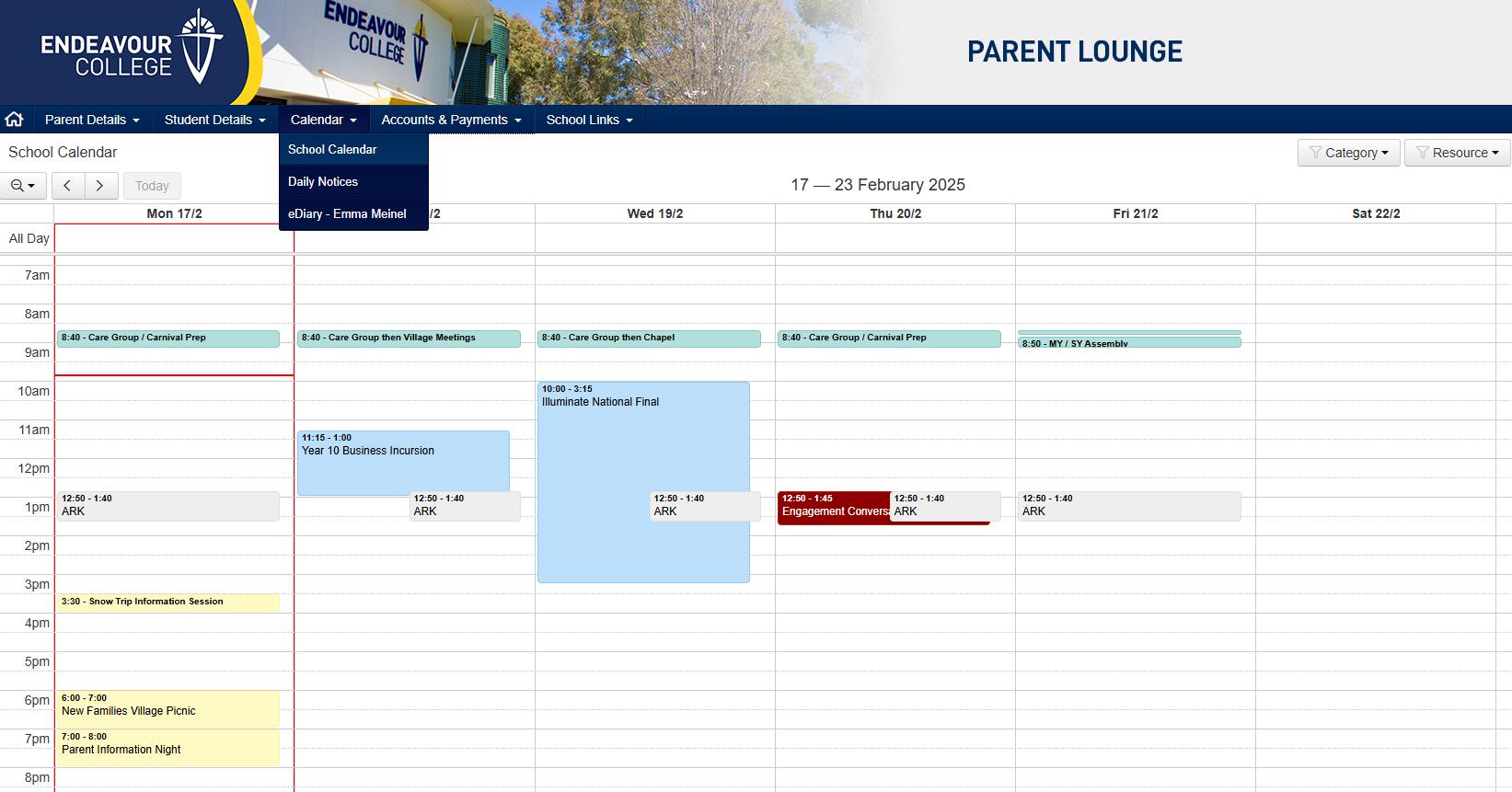

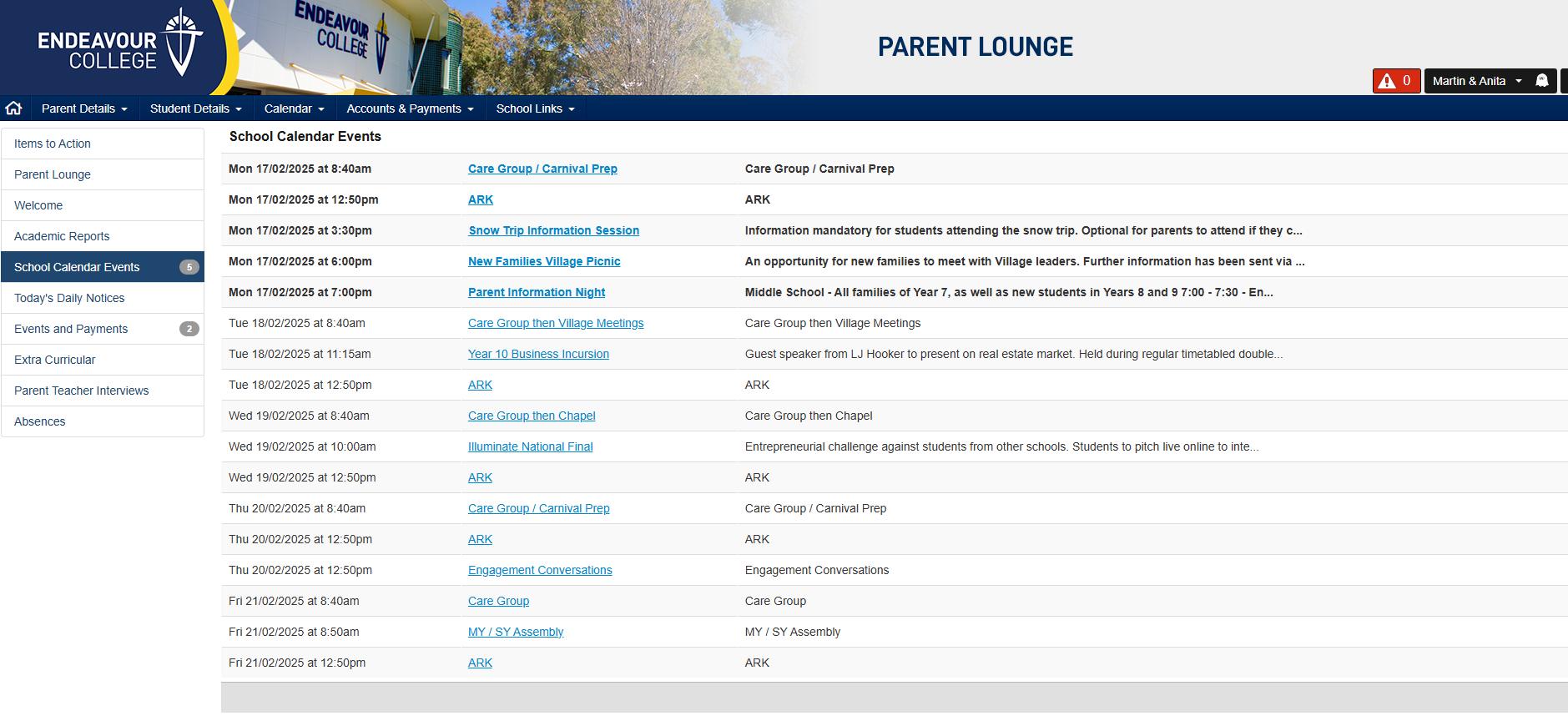


Events Function in TASS Parent Lounge
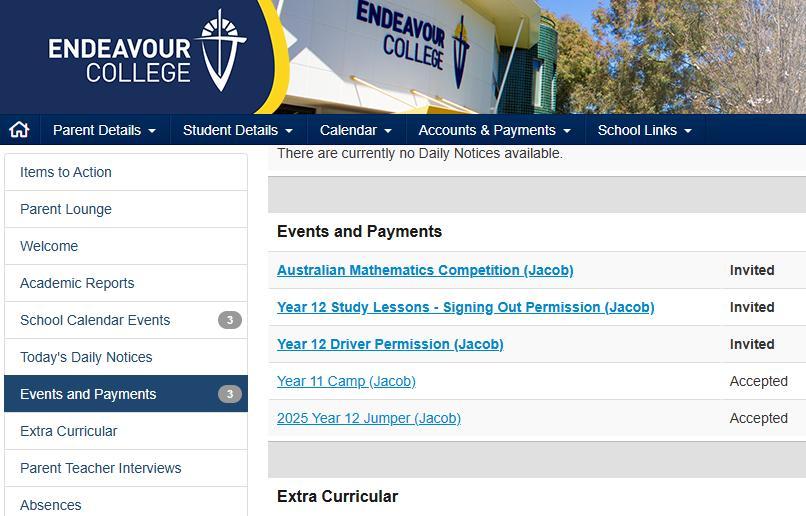











We will continue to use of the TASS Events Function for giving permission for your child to attend events and excursions



SACE Overview

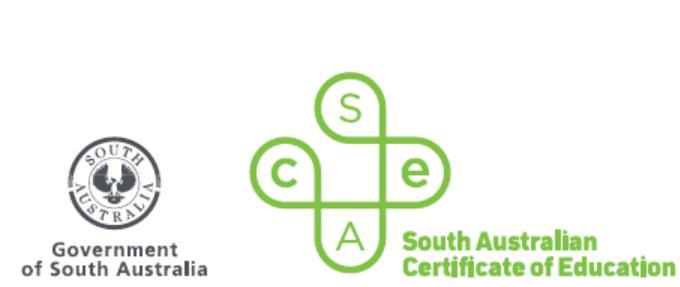
Assessment
• Assessment Policy Statements have been issued to all students.
• It is important that both parents and students understand these expectations.
• If your child does not understand the policy, they should chat to their Head of Village or subject teachers to clarify any questions.
• It is a SACE requirement that all students adhere to the SACE Assessment Policy that is upheld at Endeavour College.
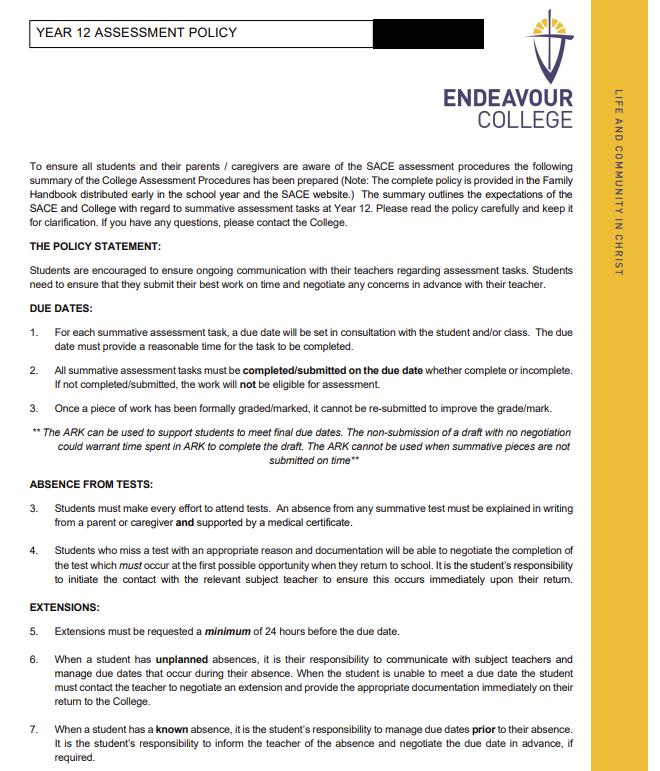

• Due dates and extensions (at teacher discretion, upon early application and on an individual basis).
• Plagiarism (dealt with according to SACE guidelines. Students commit to submission of their own independent work. TurnItIn is used as a verification tool).
• Absences (medical certificates must be provided when summative assessment tasks are missed).


Assessment
• A+ to E- grades in every subject

• Performance Standards make clear what students need to achieve for a particular grade in each subject.
• These Performance Standards are used to determine that the student has provided evidence at a particular grade band.
Assessment
Moderation
• School assessed part of each Stage 2 subject is moderated by experts outside the school.

• Ensures A grade in one school is same standard as A grade in another.
• Moderators do not seek to change the grade, but to verify that the evidence presented matches the grade awarded by the teacher.
• 70% of the final grade is marked by the teacher. We are aiming for B- minimum!
External Assessment
• 30% of every Stage 2 subject marked by experts outside of the school. This could be an examination, a final product or a performance.
AI use

Encouraged Use
• summarise your ideas
• find sources of information
• ask for prompts and ideas
• summarise sources or reduce the reading level
• check grammar and spelling
Work ceases to be your own or is unethical when
• the ideas presented are not your own
• there has been too much reliance on wording changes such that the words impact the overall meaning or it changes how you would write
• AI has been used to re-write passages
• AI has been used to create a piece of work in its entirety.
• sources cited do not exist
Electronic Examinations

Electronic Examinations for 2025:
• Biology
• English Literary Studies
• German
• Japanese
• Modern History
• Psychology
Please note:
Examinations for subjects being studied externally through School of Languages or Open Access will usually be taken at Endeavour College as the examination centre. Students should check with their external schools about examination centres for their subject.
Achievement of SACE

Students wishing to receive a SACE grade:
• Must achieve a C- or higher in 3 Stage 2 subjects or registered equivalent (eg VET)

Achievement of SACE
Achieving the SACE and achieving an ATAR are different. SACE requires the completion of the compulsory subjects (50 credits), 90 credits of Stage 1 or Stage 2 subjects and 60 credits at a C- grade or higher.

This is a total of 200 credits.
At Endeavour College, the majority of students achieve well in excess of this minimum.


SACE and ATAR are they the same thing?
SACE

• Qualification stating you have completed secondary schooling
• Lists grades achieved
• Lists alternative forms of learning

ATAR/University Aggregate
• Students who study 4 Stage 2 subjects qualify for an ATAR/University Aggregate
• Grades achieved in the SACE are used to calculate a University Aggregate
• The aggregate is then made into a rank order – ATAR
• One way students can gain entry into university courses.

University Entrance
Students wishing to apply for university entry must:
• Complete the SACE, including the Research Project.
• Complete 90 Stage 2 credits including at least four 20 credit Stage 2 subjects approved by universities.
• Complete prerequisite requirements for some courses.
• Note that the ATAR is a ranking. It is a number between 0 and 99.95 that indicates a student’s position relative to all other students receiving an ATAR that year.
• For example, an ATAR of 80 means that a student is in the top 20% of that cohort.
Scaling

• Scaling is a mathematical process which provides the basis for comparing student performance in different SACE/Stage 2 subjects.
• Scaling adjusts the ‘raw scores’ of a subject, to allow the results for that subject to be fairly compared with the results of any other subject. Raw scores are the results of the individual assessment components of a subject.
• There are thousands of possible combinations of subjects completed by SACE students. Scaling ensures that you are neither advantaged nor disadvantaged by choosing one combination of subjects over another.
Pathways and SATAC Applications

• Pathways Coordinator, Deb Frahn, will run a SATAC evening later in the year for students and parents.
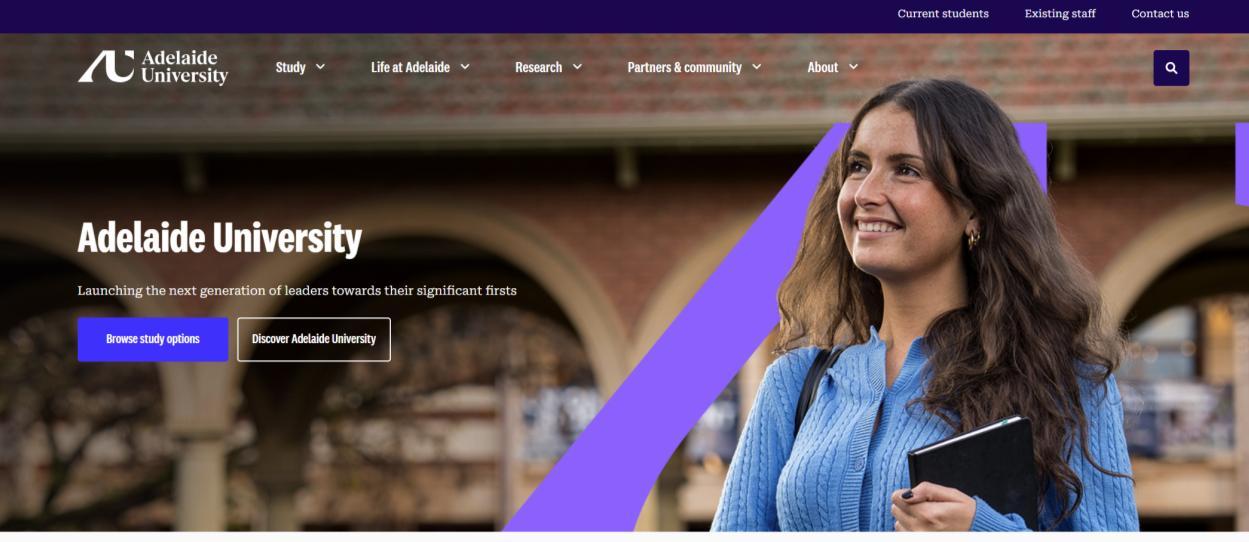


Parent Support
• Relationship.
• Support school procedures – uniform, punctuality to school, sign in/out procedures, assessment policy, etc.
• Encourage students to keep their work hours to around 10 hours.
• Help students with their organisation and time management where needed.
• Adequate time devoted to study, rest and play.

Q&A Panel
• Chloe and Miles from the class of 2024


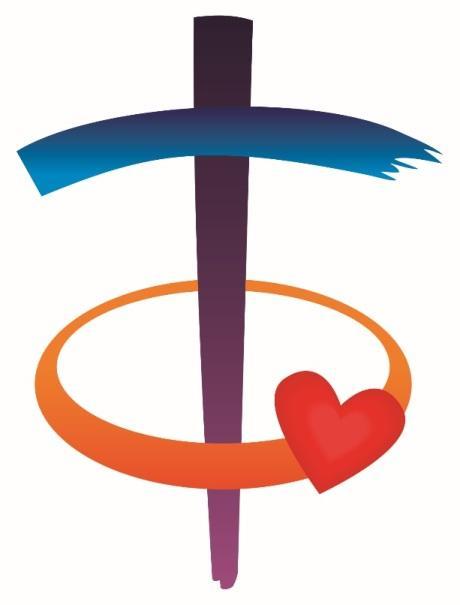
Courage Forgiveness LOVE HOPE

